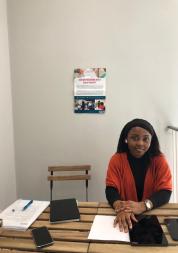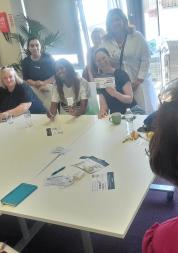Young People Contraceptive Use: Knowledge and Awareness of LARCs

Executive summary
This project was commissioned by Greenwich Health to provide insight into contraception practice and knowledge amongst young people under 18 years old. Specifically, understanding views and experience of long-acting reversible contraception (LARC).
LARC is a reliable method of contraception as it removes the risk of pregnancy due to missed doses, or incorrect use, which can occur with other contraceptive methods. However, uptake amongst young people in Greenwich is low. Findings from this research will assist Greenwich Health in tailoring, targeting, and developing service design and communication strategies to encourage greater uptake of LARCs amongst young people aged 18 and under.
To carry out this work, we recruited a group of young people aged between 16 – 18 years old as ‘co-researchers’. Our co-researchers were trained and supported to become partners in the project. They contributed to the overall design, avenues of enquiry, tool development, and were responsible for conducting depth interviews and structured surveys with their peers about contraceptive use and awareness of LARCs.
Co-researchers conducted 10 depth interviews and surveyed a further 100 young people, contributed to data analysis and took part in knowledge exchange.
As a positive unintended consequence, having received guidance and information about LARCs and general contraception themselves, our co-researchers were able to provide accurate and reliable information to over 100 young people and signpost them to additional resources.
Key Findings
- Existing knowledge and attitudes towards contraception: young people have greater understanding of methods such as condoms and the pill, and find them easier to access and use.
- Personal preference and priorities: bodily control is important for young people. Young people have fears and concerns that LARC methods reduce bodily autonomy, as well as concerns about side effects, both real and assumed. LARC methods are also perceived as inappropriate for their stage of life.
- Education and sexual health provision: young people receive most contraceptive information from school, with a focus largely on condoms or the pill, and in an atmosphere that at times does not encourage questions or discussion.
- Influence of personal and social networks: the shared experiences of friends and family, and the role of social media, have both positive and negative influences on perceptions of LARC. While young people find comfort in the sharing of common stories, misinformation about LARC methods pervades community narratives.
Recruiting young people as partners provided the following advantages:
- Young people are experts on youth issues. Through their lived experience they can explain and analyse youth issues for adult audiences.
- Given the nature and themes of this project, it was likely that young people would feel more comfortable and freer talking to peers, compared to adult researchers. In essence, young people as co-researchers facilitated the likelihood of a more trusted relationship between researcher and participant, improving the quality of the research data.
- Young people are embedded in multiple personal, social, and cultural networks, enabling greater access to their peers compared to adult researchers and allowing access to a broader cohort of young people.
- Including young people in the process of shared learning and co-production provides an opportunity to gain useful research, project management, and communication skills, enhancing employability or future study options. Moreover, our co-researchers were able to improve their own understanding of social issues that influence young people’s sexual and reproductive health.
Download the full report here
If you need this report in a different format, contact info@healthwatchgreenwich.co.uk

